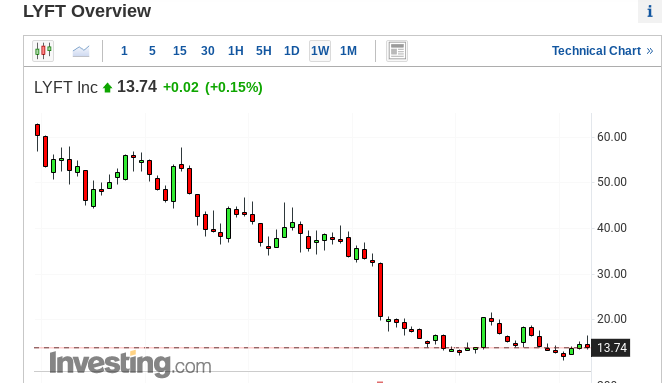- Lyft is more vulnerable than its main rival, Uber, in a potential economic slowdown
- The biggest weakness that makes Lyft more exposed to economic shock is that it has failed to diversify during the past two years
- Uber has capitalized on the boom in delivery by expanding into other categories, making its business more resilient
The 70% plunge in Lyft (NASDAQ:LYFT) shares this year doesn’t look justifiable at first glance. The San Francisco-based ride-sharing company is rebounding from the pandemic-triggered loss of business while vowing to maintain profitability during a period of macroeconomic instability.
For the quarter that ended on June 30, the ride-hailing company reported adjusted earnings of $79.1 million, far surpassing the $18.1 million average analysts were expecting. Revenue rose 30% from a year earlier to $991 million.
For third-quarter earnings, scheduled to be released Monday after the market close, analysts polled by Zacks expect sales to jump 22% to $1.05 billion when compared with the same period a year earlier, while profit per share is expected to jump to $0.08.
But this growth in earnings doesn’t hide the fact that Lyft is much more vulnerable than its main rival, Uber Technologies (NYSE:UBER) in a potential economic slowdown. And that’s the major reason that the market has turned so bearish on Lyft stock. Analysts have drastically cut their EPS forecasts for the company.
The biggest weakness that makes Lyft more exposed to economic shock is that it has failed to diversify over the past two years. At a time when the ride-hailing segment of the market is facing multiple pressures, including persistent driver shortages, cost escalation, and regulatory challenges, Lyft is compelled to turn to cost-cutting.
While highlighting these challenges just before its third-quarter earnings report tomorrow, Lyft told employees in a memo that it’s cutting 13% of its staff as it confronts a squeeze in consumer spending from high inflation and a worsening economy. In a memo cited by the media, Lyft Co-Founders John Zimmer and Logan Green said:
“We are not immune to the realities of inflation and a slowing economy. We need 2023 to be a period where we can better execute without having to change plans in response to external events — and the tough reality is that today’s actions set us up to do that.”
Despite a broad-based rebound in ride-hailing in the post-pandemic world, Lyft doesn’t make a compelling investment case. If you want to take advantage of this weakness in the gig-economy stocks, I find that Uber is a much better bet.
Uber Eats’ Advantage
Uber CEO Dara Khosrowshahi’s key post-pandemic strategy has been to capitalize on the boom in delivery by expanding into other categories, such as convenience-store items, alcohol, and groceries, turning the Uber rides app into much more than just ride-sharing.
The San Francisco-based company last week reported that its food-delivery arm, Uber Eats, generated $13.7 billion in gross bookings during the third quarter. The unit, which offers delivery across restaurants, groceries and alcohol, has grown to make up about 33% of the company’s total revenue.
This strength is the major reason that shares of Lyft and Uber diverged this year, with investors finding more value in Uber. While Lyft stock fell more than 70% in the past 12 months, Uber share losses are about half of that.

Source: Investing.com
RBC Capital Markets, while downgrading Lyft shares to sector perform from outperform, said the company is struggling to gain market share:
“Our U.S. driver supply analysis makes our prior bullish thesis look increasingly less likely, prompting us to downgrade to Sector Perform. We believe UBER’s structural advantages are driving increased competitive intensity for LYFT where long-term profit targets likely limit its ability to maneuver.”
In a recent note, Wolfe reiterated Uber as a top pick, saying it sees a “significant runway for profitability” for the company. Bernstein also reiterated Uber as outperform, arguing that during a harsh economic environment, investors should stick with market leaders, such as Uber, that can emerge from this period as better businesses.
Bottom Line
Lyft’s focus on the ride-hailing business makes its stock less resilient during a potential economic downturn. That weakness makes its stock more vulnerable than its main rival, Uber.
Disclosure: At the time of writing, the author doesn’t have a position in stocks mentioned in this article. The views expressed in this article are solely the author’s opinion and should not be taken as investment advice.
